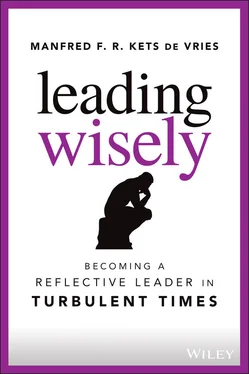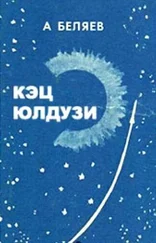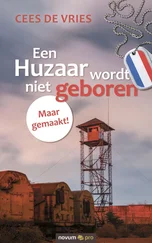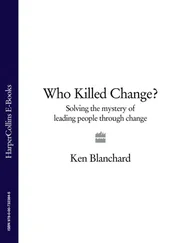Manfred F. R. Kets Vries - Leading Wisely
Здесь есть возможность читать онлайн «Manfred F. R. Kets Vries - Leading Wisely» — ознакомительный отрывок электронной книги совершенно бесплатно, а после прочтения отрывка купить полную версию. В некоторых случаях можно слушать аудио, скачать через торрент в формате fb2 и присутствует краткое содержание. Жанр: unrecognised, на английском языке. Описание произведения, (предисловие) а так же отзывы посетителей доступны на портале библиотеки ЛибКат.
- Название:Leading Wisely
- Автор:
- Жанр:
- Год:неизвестен
- ISBN:нет данных
- Рейтинг книги:5 / 5. Голосов: 1
-
Избранное:Добавить в избранное
- Отзывы:
-
Ваша оценка:
- 100
- 1
- 2
- 3
- 4
- 5
Leading Wisely: краткое содержание, описание и аннотация
Предлагаем к чтению аннотацию, описание, краткое содержание или предисловие (зависит от того, что написал сам автор книги «Leading Wisely»). Если вы не нашли необходимую информацию о книге — напишите в комментариях, мы постараемся отыскать её.
Leading Wisely: Becoming a Reflective Leader in Turbulent Times,
Leading Wisely: Becoming a Reflective Leader in Turbulent Times
Leading Wisely — читать онлайн ознакомительный отрывок
Ниже представлен текст книги, разбитый по страницам. Система сохранения места последней прочитанной страницы, позволяет с удобством читать онлайн бесплатно книгу «Leading Wisely», без необходимости каждый раз заново искать на чём Вы остановились. Поставьте закладку, и сможете в любой момент перейти на страницу, на которой закончили чтение.
Интервал:
Закладка:
Aristotle is often attributed with the statement, ‘There is a foolish corner in the brain of the wisest man.’ One cannot help but wonder if he was thinking of something comparable to the idea of the so-called Darwin Awards competition. If you do not know what I am referring to, let me explain. The ‘Darwin Award’ is a rather tongue-in-cheek honor given to people who have singled themselves out by stupidly risking life and limb in the dumbest way possible. To be selected for this award, the following criteria must apply:
In the spirit of Charles Darwin, the Darwin Awards commemorate individuals who protect our gene pool by making the ultimate sacrifice of their own lives by eliminating themselves in an extraordinarily idiotic manner, thereby improving our species’ chances of long-term survival.
In other words, the candidate's foolishness must be unique and sensational. In fact, if the Darwin Awards does prove anything at all, it is that even presumably intelligent people can remove themselves from the gene pool in apparently ridiculous ways.
I remember how I could well have received an honorable citation for the Darwin Awards while canoeing with my wife and two children on the Concord River in Massachusetts. Due to the fast-melting snow, the river had completely flooded its banks. Large parts of what used to be land were now inundated. While happily paddling between the many trees that were now standing in the water, we came across a large, low hanging branch that was blocking our passage. Showing no judgement at all, I told everyone in the canoe to lean to one side to be able to pass under that branch, with the obvious result that the canoe keeled over and everyone suddenly spilled into the water. It was an amazingly stupid suggestion on my part.
Soaking wet, I fished the children out of the water and, for reasons of safety, put them on this infamous branch. Together with my wife – as we were able to stand in the overflowed river – we tilted the canoe to pour out the water. Subsequently, the two of us, completely soaked, paddled back to the shore like mad. When we got into our car, we put on maximum heat and drove home to Cambridge as fast as possible. We were lucky that we did not drown or catch pneumonia, but in future canoeing expeditions, I kept William Blake's admonition in mind: ‘A fool sees not the same tree that a wise man sees.’ I had learned something the hard way. I had learned from experience. Never was such an accident going to happen to me again. In the future, I would have better judgement. In future actions, I would try to be wiser.
Beyond book learning
Even though I wrote this book only recently, in more than one way, these musings on wisdom in the context of leadership have been in the works for a very long time. In fact, it is fair to say that this book reflects the ruminations of my own struggles with foolishness, all the while trying to acquire a touch of wisdom. Although book learning has always been important to me, knowledge alone never seemed to be enough in dealing with many of the questions that I faced in my daily work as a professor, psychoanalyst, consultant and executive coach. Although I always thought that to acquire knowledge, studying does not hurt, to acquire wisdom, clearly something more was needed. Making efforts to appear knowledgeable did not seem to be good enough. Among other things, I realized that I needed to learn how to observe. If I wanted to act wisely, I needed to really make sense of what was going on around me. Fortunately, in that respect, my long psychoanalytic training turned out to be very useful.
Apart from needing to become more proficient in seeing things, much of what I have learned in life has also come to pass through the questioning of my students. These demanding interchanges – because, far too often, it had to do with questions to which there were no easy answers – were a good lesson in humility. Again and again, these discussions reminded me of my ignorance – it showed how little I really did know. In hindsight, I realized that I became even more aware of my limitations in sense making when I designed a program for C-suite executives at INSEAD, where I have been teaching for a very long time. Working with cohorts of C-suite executives from all over the globe proved to be even more of a challenge, compared to working with the much younger MBA students. Very often, the latter tended to be more gullible, while in many instances, the older executives would present me with extremely complex problems for which I had no easy answers.
For pedagogical reasons, most business schools use case studies. My approach has not been very different from that of the Harvard Business School – the epicenter of case studies – which is one of my alma maters. During a lifetime influenced by their pedagogical approach, I must have written over a hundred of these case studies. Frankly speaking, case studies have always been an excellent way to create the illusion of decision-making omnipotence – to provide students with the fantasy that they could tackle any difficult problem. Certainly, I was no exception, having once had similar illusions. After all, I had also at one time done an MBA. However, in this particular seminar, specifically designed for leaders of organizations, my approach became somewhat different. In this instance, I decided to take advantage of the fact that the interesting case studies were sitting right in my class. I came to realize that using my participants as prospective study subjects allowed me and others in the class to engage in a more in-depth way of sense making, compared to the traditional case study approach.
I should add that most case studies about senior executives are of a somewhat hagiographic nature, something I am very aware of, given my own case writing history. Why this is so, is that the protagonists in these case studies generally have ‘the final cut’, enabling them to take out of the case any information they do not fancy. Unfortunately, by doing so, the ‘nerve is often taken out of the material’. In addition, to add to this ‘cleansing process’, I should mention the case writer's tendency towards self-censorship, his or her not wanting to include material that may seem to be too controversial, exactly because of the existence of this right of final cut. Furthermore, if truth be told, based on my own experience, it is rather rare for executives to truly open up in these case studies – to talk frankly about what is really troubling them. Getting them to go deep enough to tell a more complete story about the challenges they are facing in their lives is always an uphill struggle. After all, it is so much safer to keep the conversation at a rather superficial level.
In the seminars I designed, however, hagiography was not something that had a long life span. As the objective of the program is to help participants develop deeper insights about themselves – to find ways to navigate through life's challenging situations – staying merely on the surface is not really an option. It would be difficult to keep the discussions going by remaining at a superficial level. As a matter of fact, it would be a real waste of time. Yet, most participants tended to open up, as their defenses wore down. Gradually, they would pay more heed to the statement ‘no interpretation without association’. They would come to realize that if they kept the discussion merely at a superficial level, they would not get much out of such a seminar. To go beyond superficialities was in their best interest. Of course, what facilitated the process of having the participants really open up was that their colleague-participants were becoming increasingly effective in identifying what was happening beneath the surface. As time went by, what would come to the surface were the real issues that the person ‘in the hot seat’ was trying to deal with.
Читать дальшеИнтервал:
Закладка:
Похожие книги на «Leading Wisely»
Представляем Вашему вниманию похожие книги на «Leading Wisely» списком для выбора. Мы отобрали схожую по названию и смыслу литературу в надежде предоставить читателям больше вариантов отыскать новые, интересные, ещё непрочитанные произведения.
Обсуждение, отзывы о книге «Leading Wisely» и просто собственные мнения читателей. Оставьте ваши комментарии, напишите, что Вы думаете о произведении, его смысле или главных героях. Укажите что конкретно понравилось, а что нет, и почему Вы так считаете.












